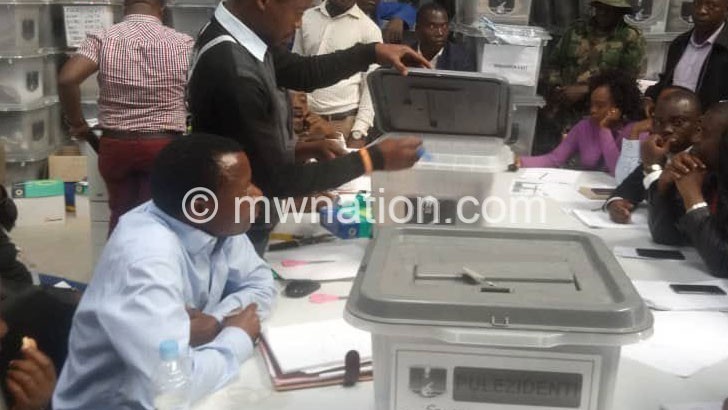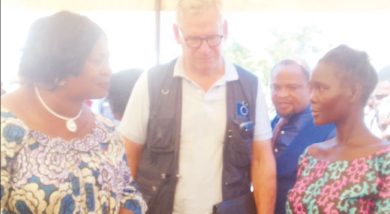All set for Polls case
Wheels of justice are set to start rolling today when a five-judge panel of the High Court sitting as the Constitutional Court starts hearing petitions to nullify presidential results in the May 21 Tripartite Elections.
Hearing of the historic case, whose proceedings will be covered live on radio, is expected to run for the next 10 days as per directions of the court. It comes at a time the nation is on fire due to post-election protests.
In separate interviews yesterday, lawyers representing the petitioners and respondents alike indicated they were set for the legal battle which previously faced numerous preliminary challenges during the scheduling conference the court organised to map the way forward.

Being heard by a panel of five High Court judges comprising Healey Potani, Mike Tembo, Dingiswayo Madise, Redson Kapindu and Ivy Kamanga, the case has UTM Party president Saulos Chilima as the first petitioner and Malawi Congress Party (MCP) president Lazarus Chakwera as the second petitioner. President Peter Mutharika of Democratic Progressive Party (DPP), in his capacity as the declared winner, is the first respondent with Malawi Electoral Commission (MEC) as the second petitioner.
In an interview yesterday, George Mtchuka Mwale, a member of Chilima’s legal team, said his side was prepared for the case.
He said Chilima, being first petitioner, will be the first to present his case before the court. He said the presentation would later be supported by witnesses.
Said Mwale: “I can confirm that Dr Chilima, as the case begins, will be in court.”
Titus Mvalo, one of the lawyers for Chakwera, also said in an interview yesterday that his team was geared up for the case. But he said they would still expect the court to address the issue of MEC’s failure to submit an audit report of the election results.
“This is an important document and it was the court’s order. We will still demand compliance,” he said while indicating that Chakwera would also be present in court.
In a separate interview, MEC lead counsel Tamando Chokotho said his team was equally ready for the case.
But he hinted that there were still some challenges because other documents, including sworn statements from Chakwera, were served late and that several other documents were yet to be served on them.
“It’s a challenge because in preparation, we needed to go through these documents and they are also introducing new issues. But all in all, we are ready for the hearing,” Chokotho said.
Frank Mbeta, a private practice lawyer representing Mutharika, said yesterday that his team was ready.
When the hearing begins in earnest this morning, assuming there will be no serious hitches by way of more preliminary issues, Chilima, the country’s immediate past vice-president, with guidance from his lawyers, would present his case.
The presentation will be followed by examination-in-chief, a process that provides one’s lawyers an opportunity to ask friendly questions emanating from his evidence to enable him drive important points home to strengthen his case.
Thereafter, lawyers representing Mutharika and MEC would, in cross-examination, take turns to bombard Chilima with questions. Usually, in cross-examination, lawyers tend to ask questions to discredit the tendered evidence.
During the cross-examination, Chilima’s lawyers would be on alert and, where necessary, raise objections where they feel lawyers for MEC or Mutharika are intimidating their client or are raising questions they consider defective. In such times, the presiding judges give directions.
When MEC and Mutharika lawyers are done with Chilima, other friends of court who joined the matter would also cross-examine the first petitioner if they find it fit.
From there, Chilima’s lawyers would take the floor again, this time around, for re-examination, a process where lawyers try to make their client explain certain things they feel were discredited during the cross-examination which is usually unfriendly.
These processes, which would be happening amid reference to several documents and exchange of the same, would go on in that pattern even for Chilima’s witnesses and when the turn of Chakwera comes.
The pattern of examination-in-chief, cross-examination and re-examination would remain the same when the respondents—Mutharika and MEC officials and their witnesses—will appear in court.
Mvalo said as a party to the matter, the President would be required to be present in court to answer some questions.
Attorney General Kalekeni Kaphale (AG), a Senior Counsel (SC), coming into the case for MEC as government’s chief legal adviser, is no small legal mind as he has handled serious litigations both as AG and in his private practice. He is respectable.
Kaphale, on the MEC side, is joined by Chokotho, another serious litigator hired by MEC from private practice as lead lawyer. He was mentored by Kaphale himself. They may easily make a deadly combination.
The petitioners have an equally formidable legal team between them. Besides Mvalo and Mwale, others in the team include Modecai Msisha SC, Chikosa Silungwe (PhD) and Khumbo Bonzoe Soko, to mention but a few.
In terms of legal firms, Chakwera alone has assembled 10, including Likongwe & Company, Juris Chambers, Lloyds Associates, Odeide Tax Lawyers, Albaart Chambers, Chris & Legal and Kawelo Lawyers.
Mutharika is represented by, among others, lawyers from Mbeta and Co, M&M Global, Pious Attorneys, Makiyi, Kanyenda & Associates and Mhango & Co.
Chilima and Chakwera are challenging results of the presidential election which MEC chairperson Jane Ansah declared was won by Mutharika. The results indicated that Chakwera was second and Chilima third.
Chakwera contends that Mutharika “won a fraudulent election” fraught with irregularities, including alleged stuffing of ballot papers with pre-marked ballots, tampering with election results sheets through correction fluid and being found in possession of result sheets at home.
In 2017, Kenya’s Supreme Court annulled the result of a presidential election, citing irregularities, and ordered a new one within 60 days.
The election commission had declared incumbent Uhuru Kenyatta the winner by a margin of 1.4 million votes. Raila Odinga, Kenyatta’s opponent, said the commission was “rotten” and demanded resignations and prosecutions.





